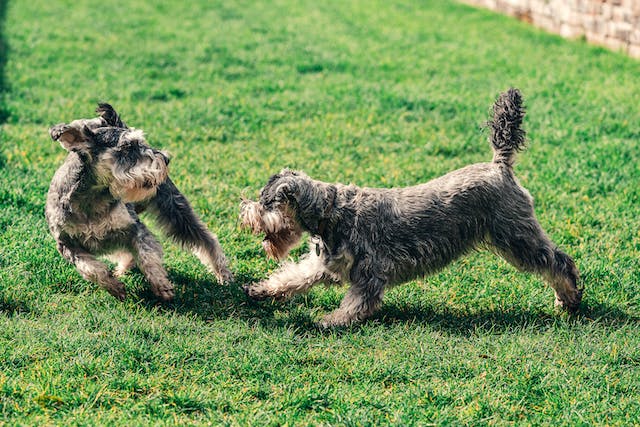With their expressive eyebrows and charming mustaches, Schnauzers have captured the hearts of many dog lovers. These spunky terriers come in three sizes – Standard, Giant, and Miniature – each boasting unique personalities and undeniable charm. But beneath their fluffy coats and playful demeanor lies a hidden truth: Schnauzers aren’t always a walk in the park (pun intended!), and some even label them “the worst dogs.”
But hold on, DoggiPro isn’t jumping on the Schnauzer-bashing bandwagon! We understand the immense love and loyalty these intelligent canines can offer. However, ignoring the potential challenges would be a disservice to both dogs and potential owners. This article highlights why some find Schnauzers demanding companions, ultimately helping you decide if this spirited breed fits your lifestyle.
Remember, there’s no such thing as a “bad” dog breed. It’s just mismatched expectations. By exploring the pros and cons of Schnauzer ownership, we hope to empower you to make an informed decision and welcome a furry friend, a Schnauzer, or another amazing breed into your life.
So, buckle up as we delve into the world of Schnauzers, their quirks, and why they might not be everyone’s cup of tea. But hey, even the most “challenging” pups can be perfect companions for the right owner! Ready to sniff out the truth? Let’s go!
Beyond the Mustache: The Grooming Demands of Schnauzers

As adorable as they are, Schnauzers aren’t exactly low-maintenance pups regarding grooming. Their signature wiry coat, while undeniably charming, requires regular attention and professional expertise to stay healthy and stylish. Buckle up, future Schnauzer owner, because we’re about to get real about the time and financial commitment involved in keeping your furry friend looking and feeling their best.
Think beyond the occasional brush
Unlike some short-haired breeds, Schnauzers’ coats don’t shed much, which sounds like a plus. The catch is that their fur continuously grows, leading to matting and discomfort if not addressed. To prevent this, they need professional grooming every 6-8 weeks. This involves stripping (removal of dead undercoat), clipping, and shaping, ensuring their coat stays healthy and manageable.
Be prepared to invest
Professional grooming is a costly undertaking. Depending on your location, breed size, and desired style, expect to pay $50-$150 per session. Consistency is key, so consider these costs when budgeting for your furry friend.
DIY alternatives (with caution)
While tempting, home grooming Schnauzers without proper training or equipment can lead to uneven cuts, skin irritation, and injuries. If you’re on a tight budget, consider learning basic grooming techniques from a professional and investing in high-quality tools. But remember, professional intervention is still crucial for maintaining their unique coat.
More than just aesthetics
Regular grooming isn’t just about vanity. It prevents ear infections, skin problems, and matting-related discomfort. So, while their charming mustaches might steal the show, remember that proper grooming is an investment in your Schnauzer’s health and well-being.
Is this a dealbreaker? If the thought of regular grooming sessions or the associated costs overwhelms you, don’t fret! There are plenty of other wonderful dog breeds with lower maintenance needs. However, if you’re up for the challenge and adore their signature style, Schnauzers can be incredibly rewarding companions!
Beyond Cuteness – Potential Behavioral Quirks

Schnauzers, with their lively personalities and sharp minds, may not always be the picture of canine obedience you see in movies. While their intelligence is undeniable, it comes with a side of independence and stubbornness that can sometimes test your patience. Let’s explore some potential behavioral challenges you might encounter with your Schnauzer friend.
The Independent Streak
Remember those adorable “stubborn Schnauzer” memes? There’s truth to the humor. Bred for independent tasks like vermin control, Schnauzers can possess a strong will. They may require firm, consistent training to learn obedience commands. Patience, positive reinforcement, and understanding of their independence are key to unlocking their full potential.
Vocal Opinions (A.k.a. Barking)
Schnauzers are known for their alertness and protective instincts, which can sometimes manifest as excessive barking. Triggers like unfamiliar sounds, people, or animals can set them off, potentially leading to noise complaints and strained relationships with neighbors. Early socialization, consistent training, and addressing the root cause of their barking are crucial to curb this behavior.
Guarding Their Territory
While loyal and loving with their families, Schnauzers can be wary of strangers and exhibit territorial behaviors if not properly socialized. This can range from barking and growling to more aggressive displays. Early exposure to different people and environments, combined with positive reinforcement, helps them become well-adjusted and confident companions.
Remember, it’s not all bad news! These potential challenges should only deter you partially. With dedicated training, consistent socialization, and understanding of their unique personalities, Schnauzers can overcome these hurdles and become well-behaved, loving companions.
The key takeaway? Schnauzers require more than just cuddles and playtime. They thrive on mental stimulation, training, and clear boundaries. If you’re an experienced dog owner with the time and dedication to invest in their development, their loyalty, intelligence, and playful spirit can make them incredible companions. But other breeds might be better if you seek a low-maintenance cuddle buddy.
Is this a dealbreaker? Only you can decide! Consider your lifestyle, experience, and commitment level before welcoming a Schnauzer. Responsible pet ownership means choosing a breed that aligns with your capabilities and expectations.
Beyond Walks in the Park: Schnauzer Health and Exercise Needs
Despite their undeniable charm, Schnauzers can have specific health and exercise demands that potential owners should consider. While generally healthy breeds, Schnauzers have certain genetic predispositions to certain conditions, and their energetic nature requires significant physical activity to thrive. Let’s delve deeper into these aspects.
Potential Health Concerns
- Liver Shunts are a congenital condition in which blood bypasses the liver, potentially leading to stunted growth, seizures, and other complications. Early detection and treatment are crucial.
- Pancreatitis: Inflammation of the pancreas, causing vomiting, diarrhea, and abdominal pain. Diet management and veterinary care are essential.
- Eye Diseases: Cataracts, progressive retinal atrophy, and other eye conditions can affect Schnauzers. Regular veterinary checkups are vital for early detection and management.
- Skin Allergies: Schnauzers can be prone to allergies, leading to itching, rashes, and discomfort. Identifying triggers and managing them with veterinary guidance is key.
- Bladder and Kidney Stones: The formation of stones in the urinary tract can be painful and require treatment. Maintaining proper hydration and monitoring urinary habits are crucial.
Remember, these are potential concerns. Not all Schnauzers will experience them. Regular veterinary care, a healthy diet, and preventive measures can significantly impact their health and well-being.
Unleashing Their Energy
Now, let’s talk about their boundless energy! Bred for tasks like vermin control, Schnauzers possess high stamina and exercise needs. Be aware of their compact size. These pups crave daily walks, playtime, and mental stimulation. Without adequate physical and mental exertion, their energy can manifest in destructive behaviors like chewing, digging, or excessive barking.
Here’s what you can expect:
- Daily walks: Aim for at least two walks per day, each lasting 30-60 minutes, depending on your Schnauzer’s size and age.
- Active playtime: Engage them in games like fetch, agility training, or puzzle toys to stimulate their minds and bodies.
- Socialization outings: Take them on regular walks to different environments to expose them to new sights, sounds, and smells, preventing boredom and potential anxiety.
Don’t underestimate their athleticism
Schnauzers excel in activities like dog sports, hiking, and swimming, providing excellent outlets for their energy and strengthening your bond.
Is this a dealbreaker? Suppose you lead an active lifestyle and dedicate time to fulfilling your exercise needs. In that case, a Schnauzer can be a fantastic exercise buddy. However, if your lifestyle is more sedentary, another breed with lower energy requirements might be better.
Remember, a tired Schnauzer is a happy Schnauzer! Meeting their exercise needs is crucial for their physical and mental well-being, preventing boredom and destructive behaviors.

Brainiacs with Whiskers: How Smart is a Miniature Schnauzer
With their expressive eyes and alert demeanors, Schnauzers have earned a reputation for being exceptionally smart dogs. But how smart are they, really? And does their intelligence translate smoothly into training and everyday life? Let’s explore!
Brainiacs of the Dog World
Schnauzers consistently ranks among the top 20 most intelligent breeds on various canine intelligence scales. They excel in problem-solving, spatial awareness, and understanding human cues. This means they can learn commands quickly, adapt to new situations, and anticipate your needs. Sounds perfect.
The Flip Side of the Coin
While their intelligence brings advantages, it also comes with unique training challenges. Here’s why:
- Independent Thinkers: Their smart minds can sometimes translate into stubbornness. They might question commands, get bored with repetitive tasks, or try to outsmart you. Patience, positive reinforcement, and consistent training are key to unlocking their full potential.
- Easily Bored Minds: Their quick learner nature means they crave mental stimulation. Repetitive training sessions or lack of mental challenges can lead to boredom and unwanted behaviors. Keep training sessions fun and varied, incorporating puzzle toys and interactive games.
- Master Manipulators: Their intelligence can sometimes be used to their advantage. They might try to manipulate situations, test your boundaries, or use their charm to get their way. Firm, consistent leadership, and clear communication are crucial to prevent unwanted behaviors.
But don’t be discouraged! The challenges come with incredible rewards:
- Fast Learners: They pick up new commands quickly, making training enjoyable and productive.
- Eager to Please: With proper motivation, they’re enthusiastic about learning and working with you, strengthening your bond.
- Adaptable Companions: Their intelligence allows them to adjust to different living situations and routines, making them versatile family companions.
Training a Schnauzer requires dedication, patience, and understanding of their unique personality. If you’re up for the challenge, you’ll be rewarded with a loyal, intelligent, and highly trainable canine companion.
Is this a dealbreaker? If you’re a first-time dog owner or prefer low-maintenance dogs, Schnauzers might require more effort than you can handle.
However, if you enjoy an active lifestyle, have experience training dogs, and appreciate a brainy companion, a Schnauzer could be your perfect match!
Building Trust and Boundaries: Socialization and Prey Drive in Schnauzers
With their lively spirits and alert nature, Schnauzers thrive on positive social interactions. However, their initial wariness of strangers and strong prey drive necessitate early and ongoing socialization to prevent potential behavioral issues. Let’s delve into these crucial aspects of Schnauzer ownership.
Building Trust with the World
- Early Exposure is Key: From puppyhood, expose your Schnauzer to diverse people, animals, and environments. Take them on socialization outings, puppy classes, and controlled interactions with other dogs. This helps them develop confidence, reduce fear, and become well-adjusted companions.
- Positive Reinforcement: Reward calm and friendly interactions with strangers and other animals. This teaches them that positive experiences come from respectful behavior.
- Respectful Boundaries: While socialization is key, respect your Schnauzer’s comfort level. Don’t force interactions. Provide safe spaces to retreat if they feel overwhelmed.
Managing the Inner Hunter
- Understanding the Prey Drive: Schnauzers, bred for vermin control, possess a strong instinct to chase small animals. This can lead to household challenges with cats, rabbits, or other small pets.
- Supervised Interactions: If you have small pets, carefully supervise interactions and ensure proper introductions. Gradually introduce them in controlled environments and prioritize safety for all animals involved.
- Redirection and Training: Channel their prey drive into positive outlets like dog sports, agility training, or interactive toys. This provides mental stimulation and reduces the urge to chase inappropriate targets.
Remember, socialization and prey drive management are lifelong commitments. Consistent effort in these areas builds a confident, well-adjusted Schnauzer, fostering positive relationships with their environment and preventing unwanted behaviors.
Is this a dealbreaker? Suppose you have small pets or live in an environment with limited opportunities for controlled socialization. In that case, a Schnauzer might not be the ideal fit. However, if you’re committed to dedicated training, supervision, and providing safe outlets for their instincts, they can thrive in multi-pet households.
Responsible pet ownership means considering all aspects of a breed before welcoming them into your life. We encourage you to carefully evaluate your lifestyle and capabilities before deciding whether a Schnauzer matches your family.
The Truth: Are Schnauzers Really “The Worst Dogs”?
We’ve explored the potential challenges of Schnauzer ownership, from their demanding grooming needs to their independent personalities and strong instincts. But remember, “worst” is a subjective term. What might seem overwhelming to one owner could be an exciting adventure for another. Let’s separate myths from facts and offer a balanced perspective on Schnauzers.
Debunking the Myths
- Myth: Schnauzers are aggressive and dangerous.
- Fact: While their protectiveness can sometimes manifest as barking or wariness, proper socialization and training can prevent aggression.
- Myth: They’re high-maintenance divas who need constant pampering.
- Fact: Their grooming needs require commitment, but regular brushing and professional trims are manageable with planning and budgeting.
- Myth: They’re stubborn and impossible to train.
- Fact: Their intelligence can lead to independent thinking, but positive reinforcement and consistent training techniques unlock their full potential.
Beyond the Challenges
Remember, every breed has its quirks, and Schnauzers come with a unique set of both challenges and rewards:
- Loyal and Loving Companions: They bond deeply with their families, offering unwavering love and affection.
- Highly Trainable and Intelligent: Their quick learning abilities make training enjoyable and rewarding, fostering a strong bond.
- Energetic and Playful: Their zest for life brings joy and entertainment to your daily routine.
- Versatile and Adaptable: They can thrive in various environments, adjusting to apartments or houses with proper exercise and attention.
The Bottom Line
There’s no such thing as a “bad” dog breed, just mismatched expectations. A Schnauzer might not be ideal if you seek a low-maintenance cuddle buddy. But a Schnauzer could be your perfect furry companion if you’re an active, experienced dog owner who appreciates intelligence, loyalty, and a playful spirit and is willing to invest time and effort into training and care.
Responsible pet ownership means choosing a breed that aligns with your lifestyle and capabilities. Carefully evaluate your expectations, available time, and resources before welcoming any dog. Do your research, ask questions, and make an informed decision that benefits you and your potential canine best friend.
We hope this comprehensive exploration of Schnauzers has helped you decide whether they fit your family.
Conclusion: Schnauzers – Friend or Foe? You Decide!
We’ve embarked on a journey exploring the world of Schnauzers, their charming mustaches, and the potential challenges that lie beneath. From their demanding grooming needs to their independent personalities and strong instincts, we’ve aimed to shed light on the realities and misconceptions surrounding this spirited breed.
So, are Schnauzers truly “the worst dogs”? As you’ve likely gathered, the answer is a resounding no! Instead, they require specific care and ownership that aligns with their unique characteristics.
Remember, every breed has its quirks, and Schnauzers are no exception. While their high energy, independent nature, and grooming demands might seem overwhelming to some, their intelligence, loyalty, and playful spirit can be incredibly rewarding for the right owner.
Ultimately, deciding whether a Schnauzer is the right fit for you hinges on your lifestyle and capabilities. Consider your experience level, available time, resources, and energy for training and exercise. Do your research, talk to Schnauzer owners, and carefully evaluate if you can provide the commitment and understanding this breed needs to thrive.
A Schnauzer might not be your match if you crave a low-maintenance cuddle buddy. But a Schnauzer could be your perfect furry companion if you’re an active, experienced dog owner who enjoys challenges, cherishes intelligence and loyalty, and can dedicate time and effort to their care.
Responsible pet ownership means choosing a breed that aligns with your life, not just your heart. Make an informed decision, and if a Schnauzer wins your heart, be prepared for an energetic, intelligent, and undeniably charming journey!
- Why Shih Tzu Are The Worst Dog: An In Depth Analysis - February 7, 2024
- Why Schnauzers Are The Worst Dogs (or Are They?) - February 7, 2024
- Can dogs eat gushers? The Answer Might Suprise You - January 26, 2024
